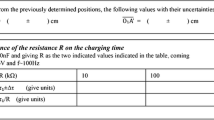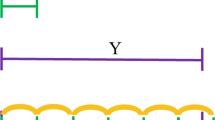Abstract
This study investigates changes in students' understanding of various aspects of measurement before and after participating in two different introductory laboratory courses at two universities in South Africa. Students' ideas were sought using a probe into their understanding of data collection, data processing and data comparison. The responses were analysed using a model which identified subjects as adhering to either a point or set paradigm. Considerable gains were made during instruction with both groups, though some important differences were identified between them. Neither group could be identified after instruction as full adherents to the set paradigm which was a goal of the instruction. Rather, the majority were found to use ad hoc or rote set action, while using point reasoning.
Similar content being viewed by others
References
Allie, S., Buffler, A., Kaunda, L., Campbell, B., & Lubben, F. (1998). First year students' perceptions of the quality of experimental measurements. International Journal of Science Education, 20(4), 447-459.
Allie, S., Buffler, A., Lubben, F., & Campbell, B. (2001). Point and set paradigms in students' handling of experimental measurements. In H. Behrendt, H. Dahncke, R. Duit, W. Graber, M. Komorek, & A. Koss (Eds.), Science education: Past, present and future (pp. 331-336). Dordrecht: Kluwer Academic Publishers.
Brown, S. J., Collins, A., & Duguid, P. (1989). Situated cognition and the culture of learning. Educational Researcher, 18(1), 32-41.
Buffler, A., Allie, S., Lubben, F., & Campbell, B. (2001). The development of first year physics students' ideas about measurements in terms of point and set paradigms. International Journal of Science Education, 23(11), 1137-1156.
Chalmers, A. F. (1994). What is this thing called science? Indianapolis, IN: Hackett.
Coelho, S. & Séré, M. G. (1998). Pupils' reasoning and practice during hands on activities in the measurement phase. Research In Science and Technological Education, 16(1), 79-96.
Davidowitz, B., Lubben F., & Rollnick, M. (2001). Undergraduate science and engineering students' understanding of the reliability of chemical data. Journal of Chemical Education, 78(2), 247-252.
Fairbrother,R. & Hackling, M. (1997). Is this the right answer? International Journal for Science Education, 19(8), 887-894.
Hackling, M. & Garnett, P. J. (1992). Expert novice differences in science investigation skills. Research In Science Education, 22, 170-177.
Hart, C., Mulhall, P., Berry, A., Loughran, J., & Gunstone, R. (2000). What is the purpose of this experiment? Or can students learn something from experiments? Journal of Research in Science Teaching, 37(7), 655-675.
Hodson, D. K. (1993). Rethinking old ways: Towards a more critical approach to practical work in science. Studies in Science Education, 22, 85-142.
Johnstone, A. H. (1997). Chemistry teaching-Science or alchemy? Journal of Chemical Education, 74(3), 262-268.
Lave, J. (1997). The culture of acquisition and the practice of understanding. In D. Kirschner & J. A. Whitson (Eds.), Situated cognition: Social, semiotic and psychological perspectives (pp. 17-36). Mahwah, NJ: Lawrence Erlbaum.
Lave, J. & Wenger, E. (1991). Situated learning: Legitimate peripheral participation. New York: Cambridge University Press.
Lubben, F. & Millar, R. (1996). Children's ideas about the reliability of experimental data. International Journal of Science Education, 18(8), 955-968.
Lubben, F., Buffler, A., Allie, S., & Campbell, B. (2001). Point and set reasoning in practical science measurement by entering university freshmen. Science Education, 85, 311-327.
McGinn, M. K. & Roth, W.-M. (1999). Preparing students for competent scientific practice: Implications of recent research in science and technology studies. Educational Researcher, 28(3), 14-24.
Metz, P. A. & Pribyl, J. R. (1995). Measuring with a purpose. Journal of Chemical Education, 72(2), 130-132.
Millar, R., Lubben, F., Gott, R., & Duggan, S. (1994). Investigating in the school science laboratory: Conceptual and procedural knowledge and their influence on performance. Research Papers in Education, 9(2), 207-248.
Rollnick, M., Lubben, F., Dlamini, B., & Lotz, S. (2001). Views of South African chemistry students in university bridging programmes on the reliability of experimental data. Research In Science Education, 31, 553-573.
Rollnick, M., Zwane, S., Staskun, M., Lotz, S., & Green, G. (2001). Improving prelaboratory preparation of first year university chemistry students. International Journal of Science Education, 23(10), 1053-1071.
Roth, W.-M., McRobbie, C. J., Lucas, K. B., & Boutonné, S. (1997). The local production of order in traditional science laboratories: A phenomenological analysis. Learning and Instruction, 7(2), 107-136.
Saayman, R. (1991). A diagnosis of the mathematical and scientific reasoning ability of first-year physics undergraduates. Physics Education, 26(6), 359-366.
Saxe, G. (1999). Cultural practices as sources of development. Available at http://www-gse.berkeley.edu/faculty/gsaxe/brazil/brazil.html accessed 15/06/01.
Scott, P., Asoko, H., Driver, R., & Emberton, J. (1994). Working from children's ideas: Planning and teaching a chemistry topic from a constructivist perspective. In P. Fensham, R. Gunstone, & R. White (Eds.), The content of science: A constructivist approach to its teaching and learning (pp. 201-220). London: Falmer Press.
Slater, T. E. & Ryan, J. M. (1993). Laboratory performance assessment. The Physics Teacher, 31, 306-308.
Stubington, J. F. (1995). Quality in teaching laboratories. Chemical Engineering Education, 29(3), 186-90.
Author information
Authors and Affiliations
Rights and permissions
About this article
Cite this article
Rollnick, M., Lubben, F., Lotz, S. et al. What do Underprepared Students Learn about Measurement from Introductory Laboratory Work?. Research in Science Education 32, 1–18 (2002). https://doi.org/10.1023/A:1015022804590
Issue Date:
DOI: https://doi.org/10.1023/A:1015022804590




